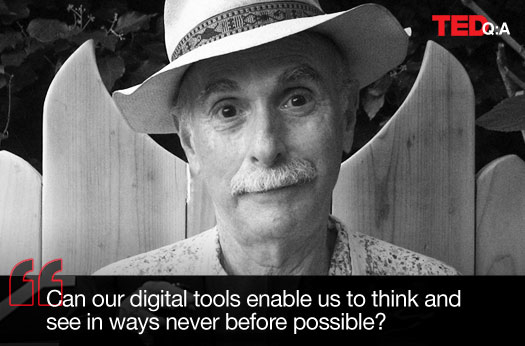Are we becoming blank-eyed cyberzombies, thanks to the internet and all the tech tools we obsess about every day? Instead of asking whether the Web is making us stupid, Howard Rheingold turns that lens around and asks how digital media could actually improve our intelligence. In his new TED Book, Mind Amplifier: Can Our Digital Tools Make Us Smarter?, he examines the origins of digital mind-extending tools, and lays out the foundations for a smarter future.
So how could this play out? We asked Rheingold to explain his theory.
We often hear that technology numbs us out and makes us dumber by degree. You argue the opposite. How?
The alphabet and the printing press were technologies that enabled more people to know more, to contribute their knowledge to others, and for more people to do more complex things together. The personal computer as we know it was originally imagined to be a tool to “augment human intellect” and “raise the collective IQ,” according to pioneer Doug Engelbart. Mind Amplifier acquaints people with the original intention of digital tools and introduces both the mental and technological components of tools that can amplify human thought and communication and suggests ways that future digital media can be designed.
How does that work?
I introduce the idea of cultural evolution — the add-ons we humans have invented to extend our physical and mental capabilities, and which we teach each other. When speech or writing, alphabets or Internets are invented, the people who learn to make use of them are capable of doing things that humans were not able to do before. When entire populations gain these literacies, civilizations become more powerful and complex. As Marshall McLuhan said: we shape our tools, and then they shape us. It’s time to be more deliberate, mindful and systematic about this process of inventing tools that change those who learn to use them.
What have we done wrong so far?
The design and production of digital tools has been driven by market forces.
We’ve seen both positive and negative effects of the widespread use of digital media, and are only beginning to see the emergence of an interdisciplinary study of mind-amplifier design. So what we have done so far has been less than mindful. Although personal computers were invented to help people solve problems, and they certainly do that, the engineering and marketing of these tools has not been mindful of the more humanistic contexts of empathy, compassion and systems thinking.
You write that humans are ‘natural-born cyborgs.’ How so?
That’s a phrase I took from philosopher Andy Clark, who wrote a book with that phrase as its title. He points out that the human mind has been partially outside our brains for a long time. If you doubt it, try to multiply two four-digit numbers without reaching for a pencil or a calculator. Although inventions such as writing and mathematics are cultural inventions, the human brain is optimized for socializing, for making tools and for social learning.
Mind Amplifier discusses the idea of automating abstract thought. Is that possible today? Are there shining examples of companies and products that are pointing in this direction?
A fine distinction, but an important one: I discuss the idea of augmenting the human ability for abstract thought. Mathematics was an example of amplifying human thought with a specific methodology and notation. Computers took the amplification of thought afforded by mathematics and automated further amplification by giving mathematicians capabilities that pencil and paper were inadequate to provide. We use hyperlinks and outliners, visualization tools and Internet protocols as tools to extend human thought. Why not concentrate more on how this extension happens — both the cognitive and technological aspects — and then become more deliberate in our design of abstraction-amplifying tools?
What are the most promising technologies in this area?
The web itself is a platform for innovation — making knowledge available, enabling collaboration, serving as a building block for more complex tools. The Internet spawned the Web, the Web made Wikipedia possible, etc. Human visual pattern-recognition is acute and computer visualization tools are powerful. Can they be matched smartly, and can our digital tools enable people to think and see in ways never before possible? Can languages for thinking together be built upon collaboration tools? Can metacognition — the human ability to become consciously aware of attentional and thought processes — be prompted by deliberately designed computer interfaces?
Mind Amplifier: Can Our Digital Tools Make Us Smarter? is part of the TED Books series. You can find this ebook for your Kindle, iBooktore or Nook, or download the TED Books app.

Comments (8)
Pingback: Mind Amplifier: New TED ebook author asks whether digital media can make us smarter | Opentopic testing center
Pingback: Mind Amplifier: New TED ebook author asks whether digital media can make us smarter | Opentopic testing center
Pingback: Quotes of the Week, October 9 « 21k12
Pingback: TED Blog | Mind Amplifier: New TED ebook author asks whether digital media can make us smarter | whatblewmymindtoday
Pingback: TED Blog | Mind Amplifier: New TED ebook author asks whether … | The Inventing